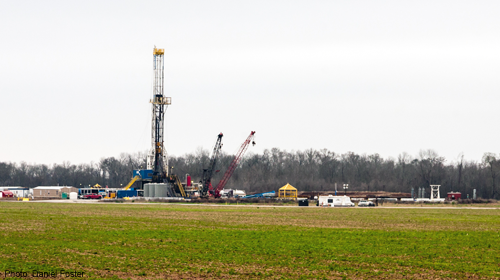
Earlier this month, the Pittsburgh Post-Gazette managed to unseal an extraordinary court transcript. In it, a local court approved an unusual settlement agreement between the Hallowich family and several natural gas companies, including Texas-based Range Resources, after the family claimed the companies contaminated their land through nearby "hydraulic fracturing," more commonly known as "fracking."
The Hallowichs agreed to drop their lawsuit in exchange for $750,000, with which they planned to buy a new, unpolluted house.
They also agreed to a broad gag order, which raises several First Amendment issues for the books (and which prompted Stephen Colbert to hilariously quip last week "paying for silence is catching on like tapfire"). The gag, according to the transcript, bars the entire family, including two children aged 7 and 10, "from ever commenting on anything to do with fracking or Marcellus Shale." (The Marcellus Shale is a huge rock formation in the eastern United States that contains a lot of untapped natural gas.)
The first unusual free speech angle to the story is that the gag purported to apply to the kids (I should note that the natural gas company now claims that it never intended to extend the gag to the children, though the transcript appears to suggest otherwise).
The second comes from the italicized bit. Gag orders usually just cover the terms of the settlement or a specific legal or factual question. Courts generally allow these limited waivers of free speech rights, assuming the gag is entered into knowingly and consensually. Here, however, the waiver covers an entire range of abstract issues and topics that have nothing to do with the case.
Let's first address the gag on the kids. Pennsylvania follows the general rule that a minor who enters a contract can cancel it before they reach 18 (or within a reasonable time thereafter).
Based on very preliminary research, there's authority in the state suggesting that judge-approved settlements cannot be canceled by a minor. But there are also a few cases where the courts at least imply that the right to cancel survives court approval. There are no cases addressing whether a gag order like this can apply to minor children.
It shouldn't.
Pennsylvania courts are required to approve settlements involving minors to protect the kids. It seems deeply unfair that a child could be gagged for life by a rule that is really meant to benefit children who, as in criminal law, don't have the capacity to fully appreciate the consequences of their actions or, in this case, those of their parents.
The second question raised by the case is whether a court has the authority to approve or enforce a gag order that sweeps so broadly. As noted above, the order purports to bar both parents and children from ever discussing the Marcellus Shale and the controversial process of fracking (the injection of high pressure water, chemicals, and sand into rock to release trapped natural gas, which many claim raises serious public health and environmental risks).
The implications are absurd. The kids could never study geology. They would likely be unable to work in any job that even touches on the energy sector because natural gas is in close competition with coal, oil, and sustainable energy sources. They could never express a favorable opinion about fracking. If they move to another house above the Marcellus Shale, could they tell someone where they live?
Hopefully the defendants in this case wouldn't try and enforce the agreement in these ridiculous situations. But the vagueness and breadth of the gag will inevitably dissuade both parents and children from talking about anything even remotely related to the Marcellus Shale or fracking.
Some courts, recognizing this danger, look carefully at whether the gag is so broad it fails to advance the purpose behind the contract or settlement. They will also consider all the underlying circumstances to ensure that the waiver of First Amendment rights under a gag is understood and consensual.
Finally, there may even be an argument that although the underlying agreement is among private parties, the need for both court approval and enforcement here transforms the gag effectively into direct state censorship.
It's usually a stretch but some parties trying to challenge a gag order cite the landmark case of Shelley v. Kraemer. There, the Supreme Court held that courts could not enforce purely private racially restrictive covenants because the act of enforcement turned the state into the source of the discrimination.
In any event, these and the numerous other questions raised by the case will have to await a move by Range Resources or one of the other defendants to enforce the gag. And if someone has that much chutzpah, it'll be a First Amendment case for the ages.
Learn more about the first amendment and other civil liberty issues: Sign up for breaking news alerts, follow us on Twitter, and like us on Facebook.


